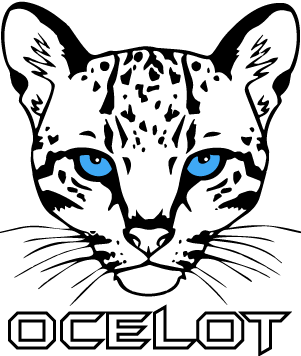Ocelot is a .NET API gateway. This project is aimed at people using .NET running a microservices (service-oriented) architecture that needs a unified point of entry into their system. However, it will work with anything that speaks HTTP(S) and runs on any platform that ASP.NET Core supports.
Ocelot consists of a series of ASP.NET Core middlewares arranged in a specific order.
Ocelot custom middlewares manipulate the HttpRequest object into a state specified by its configuration until it reaches a request builder middleware, where it creates a HttpRequestMessage object, which is used to make a request to a downstream service.
The middleware that makes the request is the last thing in the Ocelot pipeline. It does not call the next middleware.
The response from the downstream service is retrieved as the request goes back up the Ocelot pipeline.
There is a piece of middleware that maps the HttpResponseMessage onto the HttpResponse object, and that is returned to the client.
That is basically it, with a bunch of other features!
Ocelot is designed to work with ASP.NET Core and it targets net8.0 LTS and net9.0 STS target framework monikers (TFMs). 1
Install Ocelot package and its dependencies using NuGet package manager:
Install-Package OcelotOr via the .NET CLI:
dotnet add package OcelotAll versions are available on NuGet.
- RST-sources: This includes the source code for the documentation (in reStructuredText format, .rst files), which is up to date for the current development. And the rendered HTML documentation is available here.
- Read the Docs: This official website, in HTML format, contains a wealth of information and will be helpful if you want to understand the features that Ocelot currently offers. The rendered HTML documentation, which is currently in development, is available here.
- Ask Ocelot Guru: It is an AI focused on Ocelot, designed to answer your questions. 2
The primary features—Configuration and Routing—are always utilized by users, even in a minimal app setup, without customizations or extra configurations. Ocelot's capabilities are categorized into three main groups of features: solid, hybrid, and feature-family groups, which are explained below.
- Solid features are unique to Ocelot. They do not contain subfeatures and are not related to other features.
- Hybrid features, on the other hand, have multiple relationships with other features and can be part of other features.
- Feature families are large groups that consist of multiple subfeatures.
| Group | Features |
|---|---|
| Primary | Configuration, Routing |
| Solid | Caching, Delegating Handlers, Quality of Service3, Rate Limiting |
| Hybrid | Administration, Aggregation4, Authentication, Configuration, Dependency Injection, Load Balancer |
| Family | Configuration, Routing, Logging, Transformations, Service Discovery5 |
Feature groups are explained in the table below →
| Feature | Relationships and Notes |
|---|---|
| Administration | Administration heavily depends on Authentication, and Administration API methods are part of Authentication, Caching, and Configuration |
| Aggregation4 | Aggregation relies on Routing |
| Authentication | Authentication followed by Authorization |
| Configuration | Configuration depends on Dependency Injection, including GET/POST operations via the Administration REST API, a specialized Websockets scheme/protocol, advanced Middleware Injection, and Metadata-based extensions |
| Routing | Routing includes a specialized Websockets mode but does not support GraphQL6 |
| Load Balancer | Load Balancer is a critical dependency for Service Discovery |
| Logging | Logging includes Error Handling and Tracing |
| Service Discovery5 | Service Discovery with the following discovery providers: Consul, Kubernetes, Eureka, and Service Fabric |
| Transformations | They provide transformations for Claims, Headers, and Method |
Ocelot customizations can be configured using Metadata, developed with Delegating Handlers, and in advanced scenarios, they can be developed and then configured with Middleware Injection. For further details, refer to the Documentation.
You can see what we are working on in the backlog.
We love to receive contributions from the community, so please keep them coming.
Pull requests, issues, and commentary welcome! ![]()
Please complete the relevant template for issues and pull requests.
Sometimes it's worth getting in touch with us to discuss changes before doing any work in case this is something we are already doing or it might not make sense.
We can also give advice on the easiest way to do things ![]()
Finally, we mark all existing issues as 






![]()
Footnotes
-
Starting with version 21 and higher, the solution's code base supports Multitargeting as SDK-style projects. It should be easier for teams to migrate to the currently supported .NET 8 and 9 frameworks. Also, new features will be available for all .NET SDKs that we support via multitargeting. Find out more here: Target frameworks in SDK-style projects ↩
-
Ocelot Guru is an unofficial tool to get answers regarding Ocelot: please consider it an advanced search tool. Thus, we have an official Questions & Answers category in the Discussions space. ↩
-
Retry policies only via Polly library referenced within the Ocelot.Provider.Polly extension package. ↩
-
Previously, the Aggregation feature was called Request Aggregation in versions 23.4.3 and earlier. Internally, within the Ocelot team, this feature is referred to as Multiplexer. ↩ ↩2
-
Ocelot supports the following service discovery providers: (1) Consul through the Ocelot.Provider.Consul extension package, (2) Kubernetes via the Ocelot.Provider.Kubernetes extension package, and (3) Netflix Eureka, which utilizes the Steeltoe.Discovery.Eureka package referenced within the Ocelot.Provider.Eureka extension package. Additionally, Ocelot supports (4) Azure Service Fabric for service discovery, along with special modes such as Dynamic Routing and Custom Providers. ↩ ↩2
-
Ocelot does not directly support GraphQL. Developers can easily integrate the GraphQL for .NET library. ↩
-
See all labels for the repository, which are useful for searching and filtering. ↩



